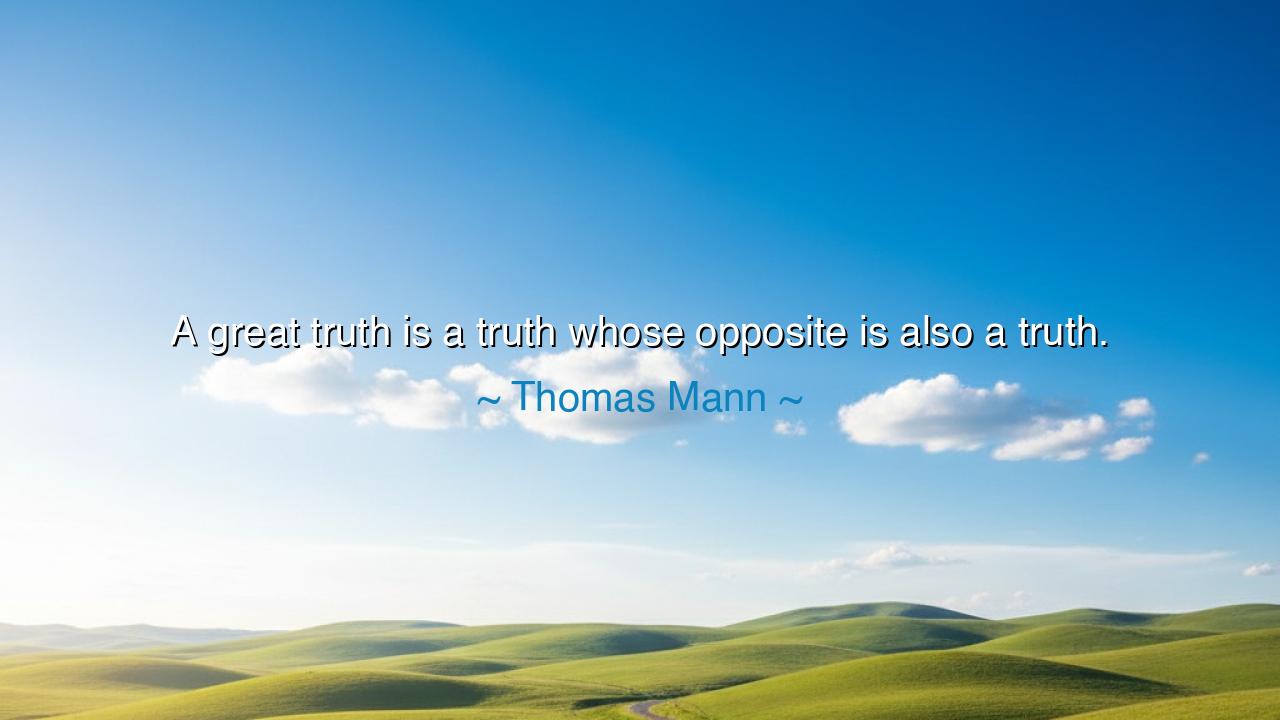
A great truth is a truth whose opposite is also a truth.






Hear the profound words of Thomas Mann: “A great truth is a truth whose opposite is also a truth.” In this saying lies a wisdom that shakes the rigid mind and humbles the arrogant heart. For ordinary truths are simple and one-sided: they live or die by opposition. But a great truth, Mann declares, is one so vast, so deep, so mysterious, that even its opposite carries truth within it. To grasp such a truth is to learn that reality is not narrow but expansive, that the world is woven of paradox, and that wisdom is found not in choosing one side, but in holding the tension of both.
The ancients knew this paradox well. Heraclitus, the dark philosopher of Ephesus, proclaimed that the road up and the road down are the same road, and that strife itself is justice. The Taoists of China spoke of yin and yang, the eternal opposites that dance together to form harmony. These teachings echo Mann’s insight: truth at its highest is not flat, but dynamic. It lives in contradiction, for only contradiction is wide enough to contain the fullness of existence.
Consider the story of justice and mercy. To say “justice is good” is true. To say “mercy is good” is also true. Yet justice and mercy are often opposites, for justice demands what is deserved, and mercy gives what is not. And yet both are great truths, and the wisdom of a ruler or a judge is to know how to balance them, not to destroy one in favor of the other. This is the kind of truth Mann speaks of: a truth so great that even its opposite must also be honored.
The origin of this reflection lies in the struggles of the modern age, where ideologies often clashed as if one alone could possess the whole truth. Mann, a man of letters in turbulent Europe, understood that life defied such simplifications. The artist and the philosopher must learn to see beyond rigid categories. Love and freedom, faith and doubt, tradition and progress—all these stand as opposites, yet each contains a truth that the other lacks. The greatness of truth lies not in eliminating contradiction but in embracing it.
This teaching warns us against arrogance. Too often, people cling to their truths as if they are absolute, casting out the opposites as lies. But such truth is small, brittle, and incomplete. The wise know that even in the heart of opposition lies something that cannot be dismissed. The soldier values courage, but the mother values caution; both truths save lives. The farmer praises sun, the priest prays for rain; both are needed for the harvest. A great truth is one that humbles us by reminding us that no single perspective contains the whole.
The lesson is clear: seek truths that can hold their opposites. Do not cling to one side of the paradox as if it alone were sacred. Ask yourself not only, “What truth do I see?” but also, “What truth lies in its opposite?” In this way, your wisdom will expand beyond rigidity into harmony. You will not be deceived by small certainties, but will be shaped by great mysteries.
Practical steps follow. When you find yourself in conflict—political, personal, or spiritual—pause to consider the truth your opponent may hold, even if it is opposite to yours. Reflect on paradoxes in your own life: strength and weakness, freedom and responsibility, joy and sorrow. Allow both to shape you, rather than denying one. And when you teach or guide others, present not only one truth, but the breadth of its contradiction, so that they too may be formed into maturity.
Thus Thomas Mann’s words endure: a great truth is a truth whose opposite is also a truth. In them we are reminded that life is not narrow, but vast, not simple, but layered with paradox. To walk in this wisdom is to walk the path of humility, of balance, and of harmony, where the mind is open and the heart is wide enough to hold the mystery of existence itself.






TTB19DCVT331 - Nguyen Trong Toan
This quote gives me a deeper appreciation for the complexity of truth. It suggests that truths aren't always black and white and that opposing viewpoints can coexist. It might be uncomfortable to accept that both sides are valid, but it could help us grow as individuals and as a society by embracing different perspectives.
HHo
Can two truths really coexist if they contradict each other? It almost feels like a philosophical dilemma, where both sides have valid points but are at odds with each other. It makes me reflect on the complexities of life and the fact that our understanding of truth may be influenced by personal experience and context.
NVNam Vu
This idea seems to reflect the paradoxes we encounter in life. For example, the concept of 'success' can mean different things to different people. Is success defined by financial wealth for some, or by personal happiness for others? This quote challenges us to consider how flexible the definition of truth really is.
Ttram
I find this quote to be quite thought-provoking. If a truth and its opposite can both hold validity, does that mean we should always question what we believe is true? Perhaps we should be more open to accepting that our perspective might not always be the only one, especially in complex situations.
HTHanh Tam
I wonder how this idea applies to our everyday lives. For instance, in relationships, two people may have completely different but equally valid truths. How do we navigate these contradictions without feeling like we're compromising our beliefs? Could it be that understanding the 'opposite truth' is key to empathy?